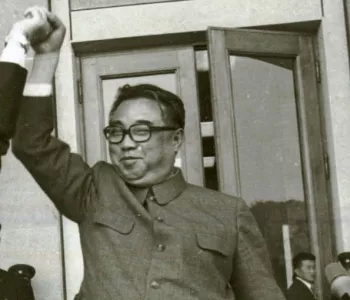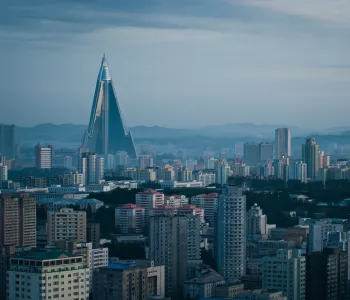d'Vinci

Han Seol-ya
Han Seol-ya (usually romanized as Han Solya in the Republic of Korea) was a novelist and the first official biographer of Kim Il Sung.

HAN SEOL-YA (1900-1976). Han Seol-ya (usually romanized as Han Solya in the Republic of Korea) was a novelist and the first official biographer of Kim Il Sung, leader of the Democratic People's Republic of Korea (DPRK). Han came from a rich peasant background and was active in anti-Japanese groups as a teenager. He took part in the 1919 Samil Undong demonstrations and served a short period in prison for his activities. In the 1920s, he was a member of the Korean Proletarian Artists' Federation (KPAF), where he mixed with other young radicals; Han, like the other writers in the group, wrote of poverty, exploitation, and revenge and the lives of ordinary people. The KPAF waxed and waned under Japanese pressure. Han was arrested with other members in 1934 and spent two years in jail. He published several novels on his release and continued to be active in the underground movements. After Japan's surrender in 1945, he emerged as the president of the central committee of the North Korean Association for Literature and the Arts, a communist front organization. He was close to Kim Il Sung, who apparently called him "teacher," and he figured prominently in both Korean Workers' Party (K WP) and state hierarchies, becoming minister of education after the establishment of the DPRK in September 1948. During this period, he wrote several eulogistic accounts of Kim Il Sung's career. He was one of the few artists to survive the political purges after the Korean War, and he continued to flourish during the 1950s.
Just as he seemed to be at the height of his career, with the publication of an English translation of his major biography of Kim Il Sung, Hero General Kim Il Sung in 1962, he came under attack from within the KWP. He was accused of coming from a pro-Japanese family, of having engaged in immorality, and various other offenses. He lost all his posts and had his properties confiscated. Since that time, he was listed as ranking 29th in the party's Central Committee, an attack that must have been sanctioned personally by: Kim Il Sung. Han and his writings disappeared from view. He reappeared 1969, though in a much lower position in the hierarchy, but then disappeared again, possibly because of illness. He is buried in the Revolutionary Martyrs' Cemetery in Pyongyang, which indicates that he remained in favor until death.
Han's writing often strikes outsiders as rather turgid, with stock characters, especially villainous missionaries. Some of his shorter works are available in translation. They include the 1951 novel Jackals, which is a bitter on American missionaries in Korea. It has also been made into a film in the DPRK.
All rights reserved. No portion of this publication may be reproduced, stored in a retrieval system, or transmitted in any form by any means, electronic, mechanical, photocopying, recording or otherwise without the prior written permission of the publisher. (Historical Dictionary of the Democratic People's Republic of Korea, by James E. Hoare, published by RLPG Books, appears by permission of the author and publisher).
Just as he seemed to be at the height of his career, with the publication of an English translation of his major biography of Kim Il Sung, Hero General Kim Il Sung in 1962, he came under attack from within the KWP. He was accused of coming from a pro-Japanese family, of having engaged in immorality, and various other offenses. He lost all his posts and had his properties confiscated. Since that time, he was listed as ranking 29th in the party's Central Committee, an attack that must have been sanctioned personally by: Kim Il Sung. Han and his writings disappeared from view. He reappeared 1969, though in a much lower position in the hierarchy, but then disappeared again, possibly because of illness. He is buried in the Revolutionary Martyrs' Cemetery in Pyongyang, which indicates that he remained in favor until death.
Han's writing often strikes outsiders as rather turgid, with stock characters, especially villainous missionaries. Some of his shorter works are available in translation. They include the 1951 novel Jackals, which is a bitter on American missionaries in Korea. It has also been made into a film in the DPRK.
All rights reserved. No portion of this publication may be reproduced, stored in a retrieval system, or transmitted in any form by any means, electronic, mechanical, photocopying, recording or otherwise without the prior written permission of the publisher. (Historical Dictionary of the Democratic People's Republic of Korea, by James E. Hoare, published by RLPG Books, appears by permission of the author and publisher).




